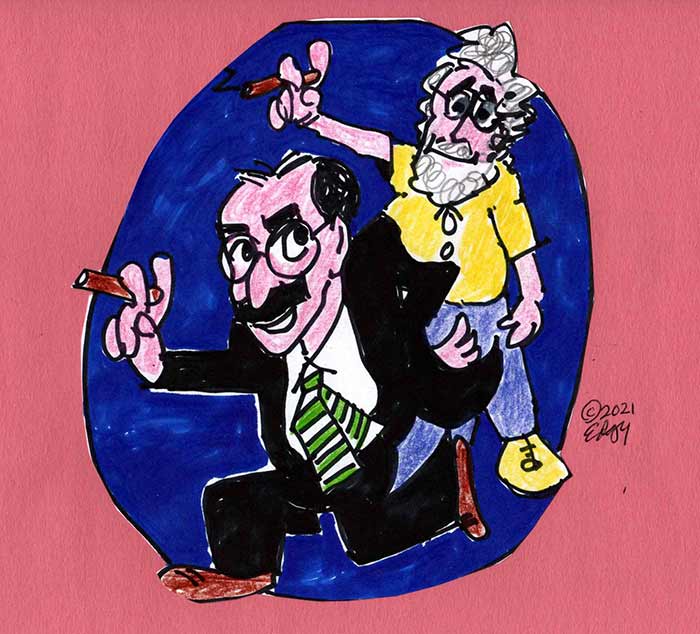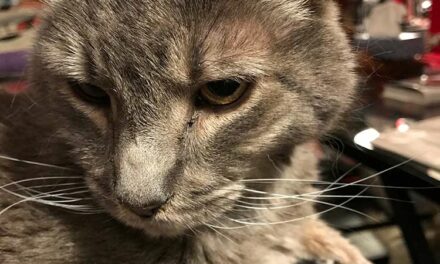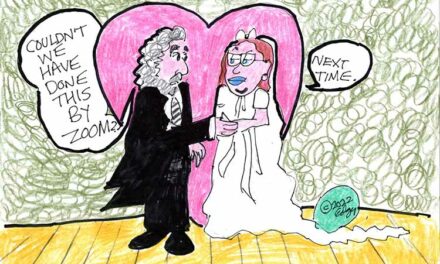A Few (Possibly Forgettable) Words About Memory
Recalling when Groucho met “Lydia”
By Ed Goldman
A small irony to me is that the only near-memorable song in Andrew Lloyd Webber’s “Cats” is called “Memory.”
An additional irony is that I can never remember its lyrics, even though the song is sung a few times during the show. Or so I recall.
Ashes to Ashes
I’ve been thinking lately about memory, the sensory mechanism that allows us to recall things our senses have, uh, sensed. I’ve also been thinking about memories, plural, the dubious anecdotes of our lives we recount either silently (to lull ourselves to sleep) or aloud (to lull our babies, guests, friends and lovers to sleep).
Memory is supposed to be elusive as we age—but so far, I’ve found the opposite to be true. I seem to have inherited (from my mom) an almost bizarre ability to remember things both bad and wonderful in keen detail.
That said, I should mention I’m also able to block, with limited success, scenarios of my very worst times, which had more to do with the suffering of people I loved than of my own surgeries, injuries or heresies. This isn’t because I’m noble or excessively empathetic. It’s just that the attitude ingrained in me from childhood was that things which seem insurmountable at night often seem trifling when we orbit back to the sun, that peculiar phenomenon called morning.
When things are truly insurmountable, no matter how much light you throw on it, that’s another story; but my parents, who endured more than their share of tragedies, passed along to me by word but mainly by example that whining never fixes anything.
I’ve also found, at times in my life when depression got me in what I suppose was its clinical grasp, that it worked better for me if I met the moroseness head on and even privately wallowed in it. Because unlike when you lock up your feelings, when the sadness lifts, you can feel the difference. I don’t think this is masochism on my part; it’s more like realism.
On a lighter note, I can still recall all the theme songs from TV shows I grew up watching, and dozens of songs from musical comedies of my era.
I can’t recall the scores of most TV and stage shows from about 1995 on but this isn’t attributable to short-term memory lapse; I simply didn’t watch that much TV or attend that many musicals. And unlike natural born liars, I really am at a loss to remember things I never knew. The very few times in my life I tried to pull that off—like saying I remembered how to fix a plumbing, wiring, automotive or domestic problem—proved disastrous. Especially the latter.
But I have this unfortunate skill to remember conversations verbatim, or very close to that. To be sure, this is a genuine asset for a journalist—but it can also be a terrible drag on a relationship, especially if I’ve decided to end an argument by saying, “Okay, I’m sure your account of what happened is correct, so let’s just forget it.” The other person may or may not be correct; and I, most assuredly, WILL NEVER FORGET IT.
Still.
About 45 years ago I went to what would be one of the last performances of my favorite comic actor, Groucho Marx. It was at the Los Angeles Music Center’s Dorothy Chandler Pavilion. I was in my mid-20s; Groucho was in early 80s. He’d become an idol of my generation, just as he’d been to earlier generations, because his persona, both on- and off-screen, was of someone who didn’t suffer fools, whether they arrived in the form of bureaucrats, high society or royalty.
Groucho was greatly diminished by the time I saw him but was still able, somewhat shakily, to read his talk from index cards with very large type. Then he brought out his “talented young piano player”—no less than Marvin Hamlisch, then still at the cusp of becoming famous. Hamlisch goofed around for a little while, “shooting” at the keys with his long fingers, the way Groucho’s brother Chico used to. Then he played the opening bars of one of the most enjoyable patter songs ever written, “Lydia the Tattooed Lady.” And then the miracle happened: Groucho dropped his index cards on the floor of the stage and sang the song’s convoluted rhymes without notes:
Lydia, oh! Lydia, say have you met Lydia
Oh! Lydia, the tattooed lady
She has eyes that folks adore so
And a torso
Even more so
Lydia, oh! Lydia, that “Encyclopedia”
Oh! Lydia, the Queen of tattoo
On her back is the Battle of Waterloo
Beside it the Wreck of the Hesperus too…
He then sang a raft of tunes from his movies—including my favorite, which should be Mitch McConnell’s theme song, “Whatever It Is, I’m Against It”—and, again, never consulted an index or cue card.
Gerontologists and those who work with Alzheimer patients and other diseases affiliated with dementia often talk about the wonders of music and musical therapy to offer an almost cosmic through-line to a person’s memory. My experience watching Groucho would be replicated many times over the next few decades as I watched people who weren’t as famous but just as determined to grapple in the destructive shadows of aging spring back to life, if only momentarily, when they were engaged by music.
At this point, my own memory remains excruciatingly clear. And while I cherish the humor and heartbreak it brings to my daily life, I have a word of advice for doctors and loved ones who may be stuck caring for me when the lights in my own room start dimming. Get me to sing “Lydia” but, for God’s sake, nothing by Andrew Lloyd Webber.
Big news! Clinique is now on Amazon.
The #1 dermatologist guided skincare and makeup brand is on Amazon Premium Beauty for the first time. Shop trusted formulas across skincare, makeup, fragrance, and men’s products.
Ed Goldman's column appears almost every Monday, Wednesday and Friday. A former daily columnist for the Sacramento Business Journal, as well as monthly columnist for Sacramento Magazine and Comstock’s Business Magazine, he’s the author of five books, two plays and one musical (so far).














